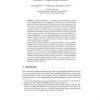Free Online Productivity Tools
i2Speak
i2Symbol
i2OCR
iTex2Img
iWeb2Print
iWeb2Shot
i2Type
iPdf2Split
iPdf2Merge
i2Bopomofo
i2Arabic
i2Style
i2Image
i2PDF
iLatex2Rtf
Sci2ools
118
click to vote
CAV
2006
Springer
2006
Springer
Safraless Compositional Synthesis
In automated synthesis, we transform a specification into a system that is guaranteed to satisfy the specification. In spite of the rich theory developed for system synthesis, little of this theory has been reduced to practice. This is in contrast with model-checking theory, which has led to industrial development and use of formal verification tools. We see two main reasons for the lack of practical impact of synthesis. The first is algorithmic: synthesis involves determinization of automata on infinite words, and a solution of parity games with highly complex state spaces; both problems have been notoriously resistant to efficient implementation. The second is methodological: current theory of synthesis assumes a single comprehensive specification. In practice, however, the specification is composed of a set of properties, which is typically evolving
CAV 2006 | Hardware | Safraless Synthesis Algorithm | Single Comprehensive Specification | Synthesis Involves Determinization |
Related Content
| Added | 20 Aug 2010 |
| Updated | 20 Aug 2010 |
| Type | Conference |
| Year | 2006 |
| Where | CAV |
| Authors | Orna Kupferman, Nir Piterman, Moshe Y. Vardi |
Comments (0)

